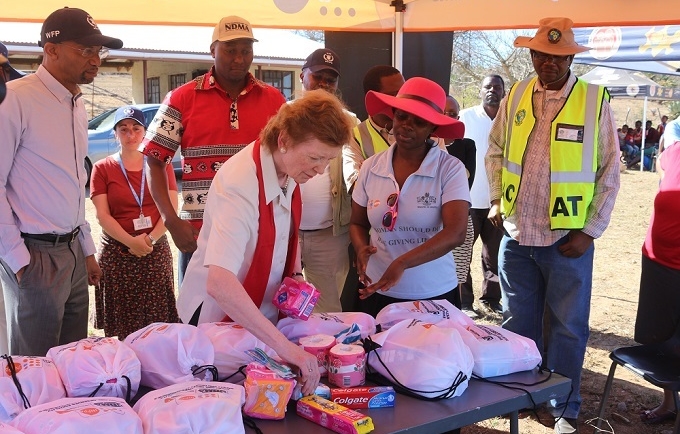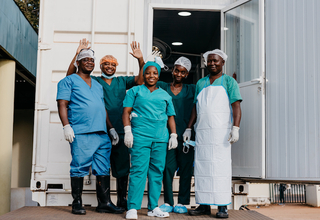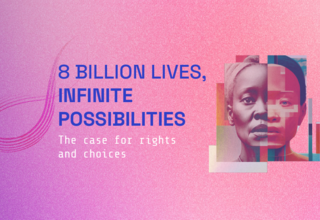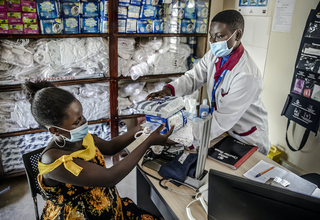MBABANE, Swaziland – When the United Nations Special Envoy on El Nino and Climate, Ms. Mary Robinson visited Swaziland on an El Nino assessment mission in September, she commended national drought efforts for going “beyond food and water” to address, among other things, sexual and reproductive health needs. She was speaking during a food distribution event at Egegebini community, one of the areas hardest hit by the drought in eastern Swaziland, where the National Disaster Management Agency (NDMA) in partnership with the World Food Programme (WFP), United Nations Population Fund (UNFPA) and two local NGOs, the African Christian Agricultural Trust (ACAT) and Family Life Association of Swaziland (FLAS) joined efforts to distribute food, water and provided sexual and reproductive health information and services to affected community members.
The El Nino induced drought was declared a national emergency in February 2016, followed by the development of a joint National Emergency Response and Adaptation Plan (NERMAP) 2016-2022 with a budget of $80.5 million to address immediate and medium term drought needs. From the early stages of developing the national drought response plan, UNFPA led advocacy to ensure that protection and health needs (including sexual and reproductive health) remained central in the national drought response agenda. Advocacy in this area was necessitated by the fact that as water, sanitation and food are the most directly impacted by a drought situation and therefore part of the central response, the same cannot be said of health and protection issues. Whilst not so obvious, particularly in the initial stages of a drought, issues of health and safety often exist alongside food and water concerns, with negative effects that become evident as the drought situation progresses.
Unfortunately, because of the above, advocacy to include protection and health (particularly sexual and reproductive health) issues in national drought response plans is not always easy or successful. For example, despite continued advocacy to include these, in the initial country appeal to the UN Central Emergency Response Fund (CERF), only food, water and sanitation concerns were said to fall within the acceptable definition of life-saving interventions in the drought situation. The United Nations CERF approved $3.14 million to commence food, water and sanitation services.
Catering for SRH and protection needs
Working with other UN agencies and local NGO partners, UNFPA continues to foster partnerships to strengthen the national health and protection drought response. The agency actively participates in the protection and health clusters of the UN Interagency Response Working Group, an interagency team that coordinates the response. At national level, the country office co-chairs the national Protection Cluster with the Department of Social Welfare under the Deputy Prime Minister’s Office. In February, UNFPA, WHO, UNICEF, WFP supported a Rapid Drought Assessment exercise and in March in a Comprehensive Drought Health and Nutrition Assessment Report. In both assessments, issues of gender-based violence and SRH-HIV and protection concerns for women and adolescent girls were incorporated.
UNFPA Swaziland has provided a total of 800 dignity kits to adolescent girls in areas hardest hit by the drought, facilitated by partnerships with NDMA, WFP and World Vision Swaziland. Collaboration with the Family Life Association of Swaziland has helped provide mobile clinic services to drought stricken communities showing the furthest radius from a health care facility. The country office has also supported several trainings on GBV/SRH in Emergencies to members of the national protection cluster. Also supported is an ongoing assessment on the impact of the drought on key vulnerable populations e.g. pregnant and lactating women, adolescent girls, women, PLHIV and the disabled.
Country office resource mobilization efforts have included a proposal to a private sector partner, Nedbank Swaziland for the provision of dignity kits and IEC materials targeting adolescent girls; a proposal for SRH, dignity kits and training from the UNFPA Humanitarian Response Branch; and a joint proposal with UNICEF to the Government of Japan.




